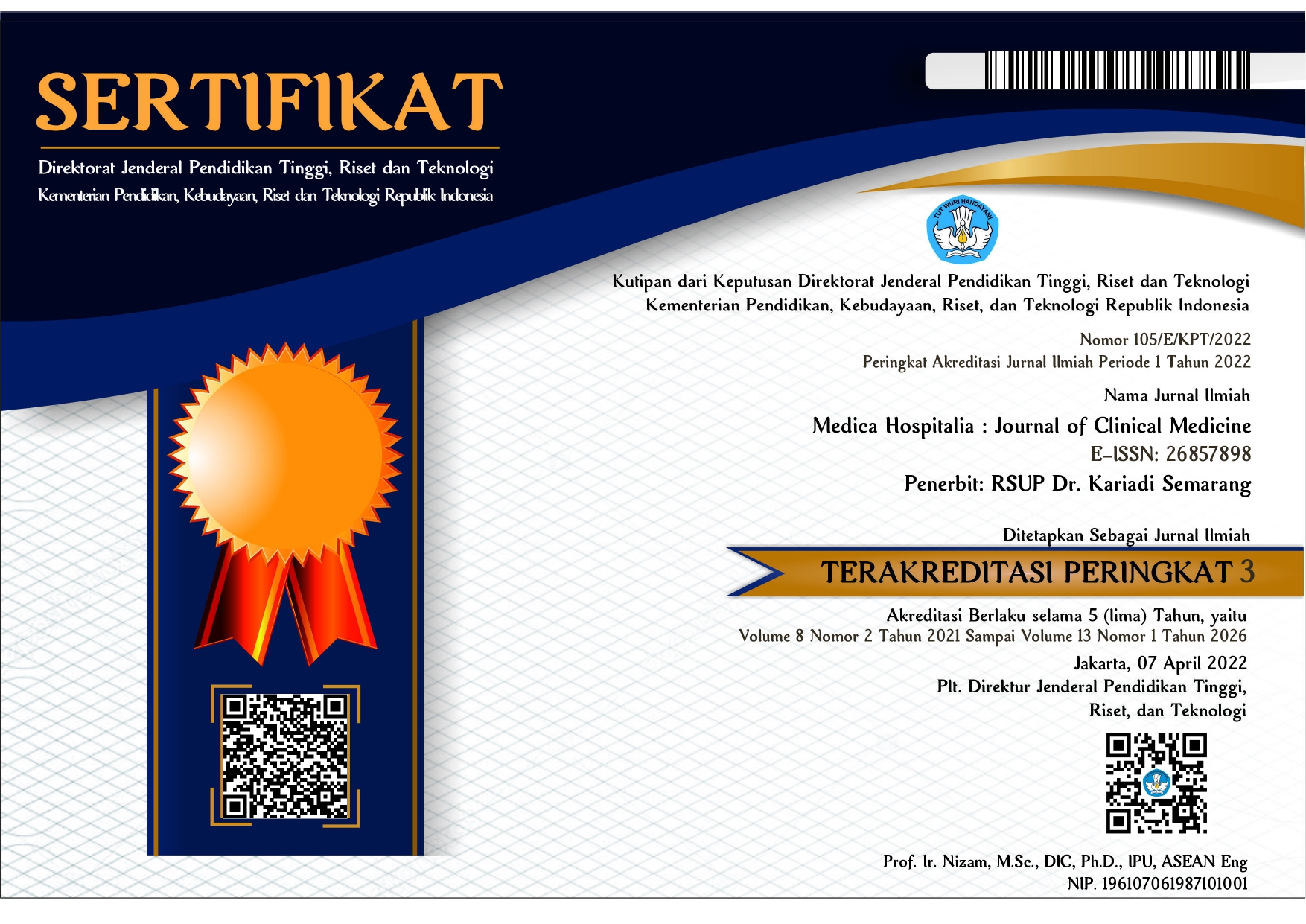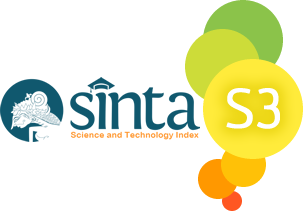Current Potential Antiviral Agents for Coronavirus Disease 2019 (COVID-19) Therapy
DOI:
https://doi.org/10.36408/mhjcm.v7i1A.460Keywords:
SARS-CoV-2, COVID-19, Antiviral Agents, Potential therapyAbstract
Severe Acute Respiratory Syndrome Coronavirus 2 (SARS-CoV-2) was first discovered in Wuhan, Hubei Province, China. SARS-CoV-2 infects the respiratory tract, which causes coronavirus disease 2019 (COVID-19). Various studies have been conducted to find effective therapies. However, there is still no specific treatment or therapy for COVID-19. This literature review, summarizes some recent research on several potential antiviral agents, both drugs that are commonly used in the medical world such as ivermectin, to medicine from herbal plants and some drugs that are in the process of clinical trials such as remdesivir, lopinavir/ritonavir, Interferon ?, ribavirin, convalescent plasma, and monoclonal antibodies for COVID-19 therapy.
KEYWORDS: SARS-CoV-2, COVID-19, Antiviral Agents, Potential therapy.
Downloads
References
2. Gasmi A, Noor S, Tippairote T, Dadar M, Menzel A, Bjørklund G. Individual risk management strategy and potential therapeutic options for the COVID-19 pandemic. Clinical Immunology. 2020:108409. doi:10.1016/j.clim.2020.108409
3. COVID-19 Dashboard by the Center for Systems Science and Engineering (CSSE) at Johns Hopkins University [Internet]. Gisanddata.maps.arcgis.com. 2020 [cited July 6, 2020]. Available from: https://gisanddata.maps.arcgis.com/apps/opsdashboard/index.html#/bda7594740fd40299423467b48e9ecf6
4. González Canga A, Sahagún Prieto AM, Diez Liébana MJ, Fernández Martínez N, Sierra Vega M, García Vieitez JJ. The pharmacokinetics and interactions of ivermectin in humans--a mini-review. AAPS J. 2008;10(1):42–46. doi:10.1208/s12248-007-9000-9
5. Caly L, Druce J, Catton M, Jans D, Wagstaff K. The FDA-approved Drug Ivermectin inhibits the replication of SARS-CoV-2 in vitro. Antiviral Res. 2020:104787. doi:10.1016/j.antiviral.2020.104787
6. Buonfrate D, Salas-Coronas J, Muñoz. Multiple-dose versus single-dose Ivermectin for Strongyloides stercoralis infection (Strong Treat 1 to 4): a multicentre, open-label, phase 3, randomised controlled superiority trial. The Lancet Infectious Diseases. 2019;19(11):1181-1190. doi:10.1016/s1473-3099(19)30289-0
7. Monteil V, Kwon H, Prado P, Hagelkruys A, Wimmer R, Stahl M. Inhibition of SARS-CoV-2 infections in engineered human tissues using clinical-grade soluble human ACE2. Cell Press. 2020. doi:DOI: 10.1016/j.cell.2020.04.004
8. Rothan H, Byrareddy S. The epidemiology and pathogenesis of coronavirus disease (COVID-19) outbreak. J Autoimmun. 2020;109:102433. doi:10.1016/j.jaut.2020.102433
9. Read S, Obeid S, Ahlenstiel C, Ahlenstiel G. The Role of Zinc in Antiviral Immunity. Advances in Nutrition. 2019;10(4):696-710. doi:10.1093/advances/nmz013
10. Suara R, Crowe J. Effect of Zinc Salts on Respiratory Syncytial Virus Replication. Antimicrob Agents Chemother. 2004;48(3):783-790. doi:10.1128/aac.48.3.783-790.2004
11. Kar M, Khan N, Panwar A. Zinc Chelation Specifically Inhibits Early Stages of Dengue Virus Replication by Activation of NF-?B and Induction of Antiviral Response in Epithelial Cells. Front Immunol. 2019;10. doi:10.3389/fimmu.2019.02347
12. Kaushik N, Anang S, Ganti K, Surjit M. Zinc: A Potential Antiviral Against Hepatitis E Virus Infection?. DNA Cell Biol. 2018;37(7):593-599. doi:10.1089/dna.2018.4175
13. te Velthuis AJ, van den Worm SH, Sims AC, Baric RS, Snijder EJ, van Hemert MJ. Zn(2+) inhibits coronavirus and arterivirus RNA polymerase activity in vitro and zinc ionophores block the replication of these viruses in cell culture. PLoS Pathog. 2010;6(11):e1001176. Published 2010 November 4. doi:10.1371/journal.ppat.1001176
14. World-first trial to test benefit of intravenous zinc in COVID-19 fight. The University of Melbourne. https://about.unimelb.edu.au/newsroom/news/2020/april/world-first-trial-to-test-benefit-of-intravenous-zinc-in-covid-19-fight. Published 2020. Accessed April 12, 2020.
15. David S, Cunningham R. Echinacea for the prevention and treatment of upper respiratory tract infections: A systematic review and meta-analysis. Complement Ther Med. 2019;44:18-26. doi:10.1016/j.ctim.2019.03.011
16. Hudson J, Vimalanathan S. Echinacea—A Source of Potent Antivirals for Respiratory Virus Infections. Pharmaceuticals (Basel). 2011;4(7):1019–1031. Published 2011 July 13. doi:10.3390/ph4071019
17. Jonsdottir H, Signer J, Albrich W. In vitro antiviral activity of Echinaforce®, an Echinacea purpurea preparation, against common cold coronavirus 229E and highly pathogenic MERS-CoV and SARS-CoV. 2020. doi:10.21203/rs.2.24724/v2
18. Jo S, Kim S, Shin D, Kim M. Inhibition of SARS-CoV 3CL protease by flavonoids. J Enzyme Inhib Med Chem. 2019;35(1):145-151. doi:10.1080/14756366.2019.1690480
19. Jo S, Kim H, Kim S, Shin D, Kim M. Characteristics of flavonoids as potent MERS?CoV 3C?like protease inhibitors. Chem Biol Drug Des. 2019;94(6):2023-2030. doi:10.1111/cbdd.13604
20. Ryu Y, Jeong H, Kim J et al. Biflavonoids from Torreya nucifera displaying SARS-CoV 3CLpro inhibition. Bioorg Med Chem. 2010;18(22):7940-7947. doi:10.1016/j.bmc.2010.09.035
21. Liang C, Tian L, Liu Y et al. A promising antiviral candidate drug for the COVID-19 pandemic: A mini-review of remdesivir. Eur J Med Chem. 2020;201:112527. doi:10.1016/j.ejmech.2020.112527
22. Beigel J, Tomashek K, Dodd L et al. Remdesivir for the Treatment of Covid-19 — Preliminary Report. New England Journal of Medicine. 2020. doi:10.1056/nejmoa2007764
23. Coronavirus (COVID-19) Update: FDA Issues Emergency Use Authorization for Potential COVID-19 Treatment. U.S. Food and Drug Administration. https://www.fda.gov/news-events/press-announcements/coronavirus-covid-19-update-fda-issues-emergency-use-authorization-potential-covid-19-treatment. Published 2020. Accessed July 14, 2020.
24. McKee D, Sternberg A, Stange U, Laufer S, Naujokat C. Candidate drugs against SARS-CoV-2 and COVID-19. Pharmacol Res. 2020;157:104859. doi:10.1016/j.phrs.2020.104859
25. Cao B, Wang Y, Wen D et al. A Trial of Lopinavir–Ritonavir in Adults Hospitalized with Severe Covid-19. New England Journal of Medicine. 2020;382(19):1787-1799. doi:10.1056/nejmoa2001282
26. Hung I, Lung K, Tso E et al. Triple combination of interferon beta-1b, lopinavir–ritonavir, and ribavirin in the treatment of patients admitted to hospital with COVID-19: an open-label, randomised, phase 2 trial. The Lancet. 2020;395(10238):1695-1704. doi:10.1016/s0140-6736(20)31042-4
27. Marano G, Vaglio S, Pupella S, et al. Convalescent plasma: new evidence for an old therapeutic tool?. Blood Transfus. 2016;14(2):152-157. doi:10.2450/2015.0131-15
28. Brown B, McCullough J. Treatment for emerging viruses: Convalescent plasma and COVID-19. Transfusion and Apheresis Science. 2020;59(3):102790. doi:10.1016/j.transci.2020.102790
29. Tanne JH. Covid-19: FDA approves use of convalescent plasma to treat critically ill patients. BMJ. 2020;368:m1256. Published 2020 Mar 26. doi:10.1136/bmj.m1256
30. Jahanshahlu L, Rezaei N. Monoclonal antibody as a potential anti-COVID-19. Biomedicine & Pharmacotherapy. 2020;129:110337. doi:10.1016/j.biopha.2020.110337
31. Wang C, Li W, Drabek D et al. A human monoclonal antibody blocking SARS-CoV-2 infection. Nat Commun. 2020;11(1). doi:10.1038/s41467-020-16256-y
Additional Files
Published
How to Cite
Issue
Section
Citation Check
License
Copyright (c) 2020 Medica Hospitalia : Journal of Clinical Medicine

This work is licensed under a Creative Commons Attribution-ShareAlike 4.0 International License.
Copyrights Notice
Copyrights:
Researchers publishing manuscrips at Medica Hospitalis: Journal of Clinical Medicine agree with regulations as follow:
Copyrights of each article belong to researchers, and it is likewise the patent rights
Researchers admit that Medica Hospitalia: Journal of Clinical Medicine has the right of first publication
Researchers may submit manuscripts separately, manage non exclusive distribution of published manuscripts into other versions (such as: being sent to researchers’ institutional repository, publication in the books, etc), admitting that manuscripts have been firstly published at Medica Hospitalia: Journal of Clinical Medicine
License:
Medica Hospitalia: Journal of Clinical Medicine is disseminated based on provisions of Creative Common Attribution-Share Alike 4.0 Internasional It allows individuals to duplicate and disseminate manuscripts in any formats, to alter, compose and make derivatives of manuscripts for any purpose. You are not allowed to use manuscripts for commercial purposes. You should properly acknowledge, reference links, and state that alterations have been made. You can do so in proper ways, but it does not hint that the licensors support you or your usage.

























